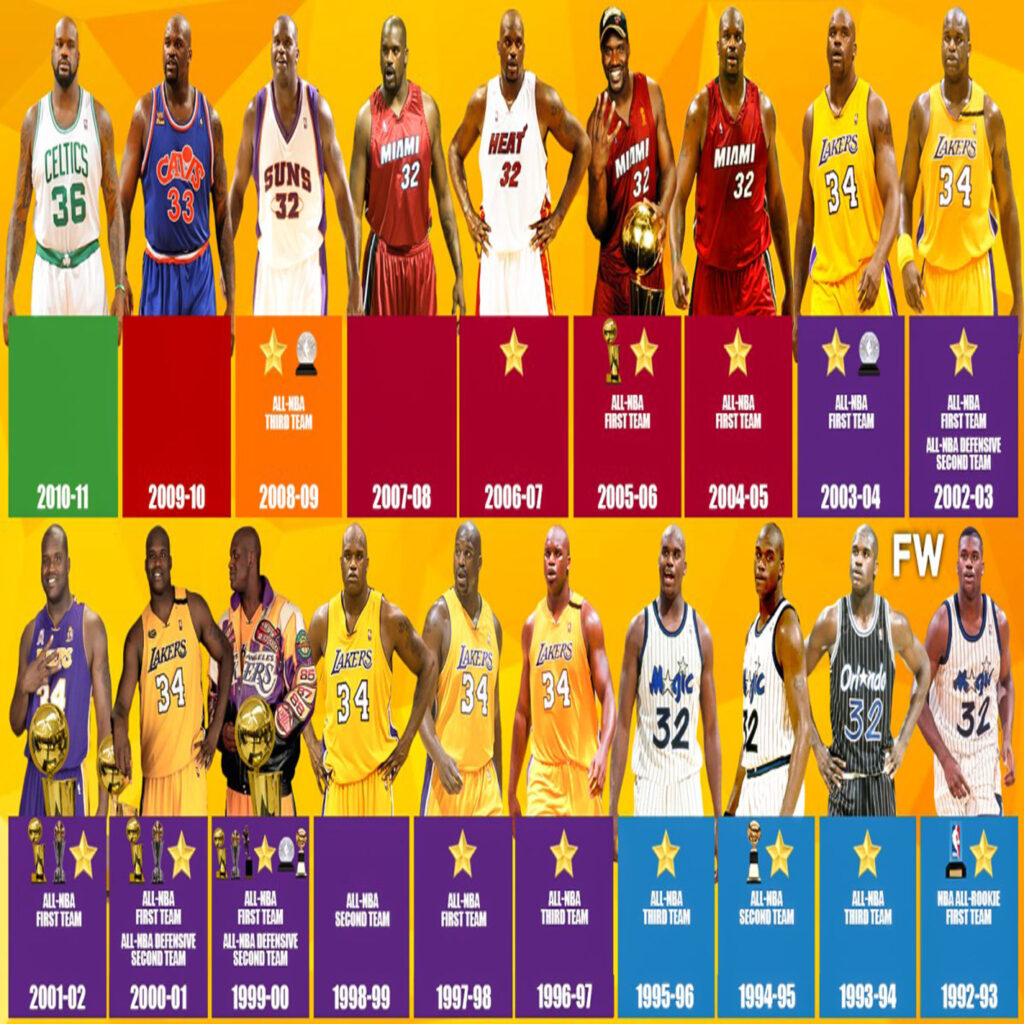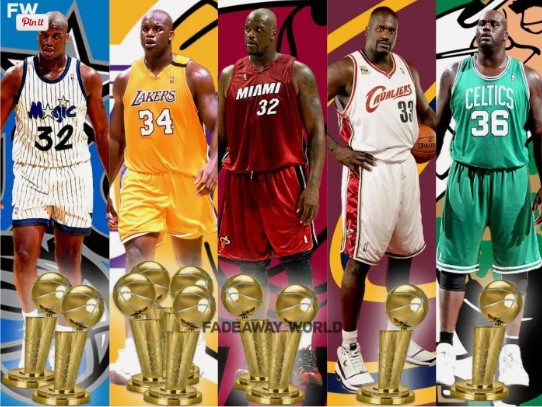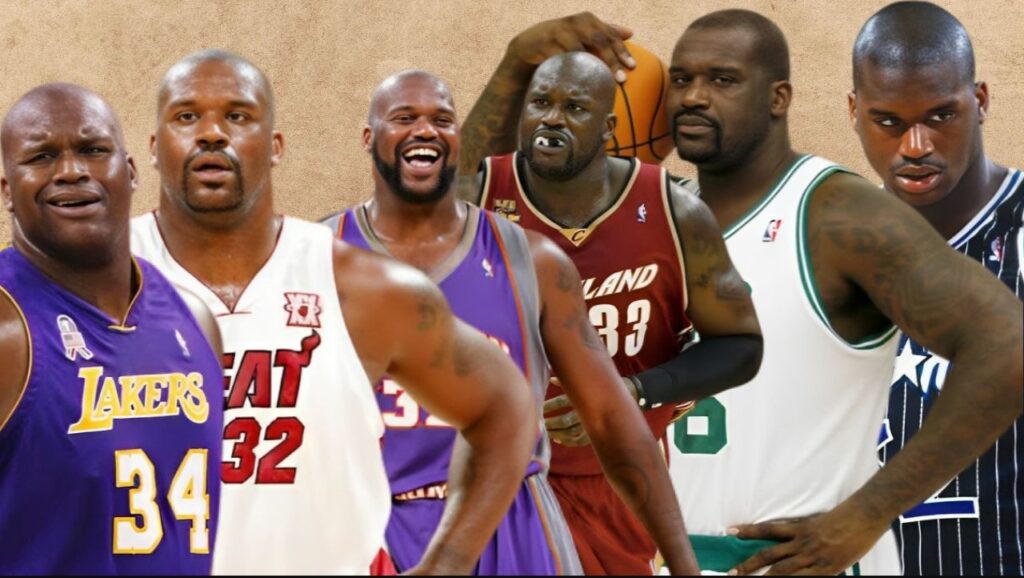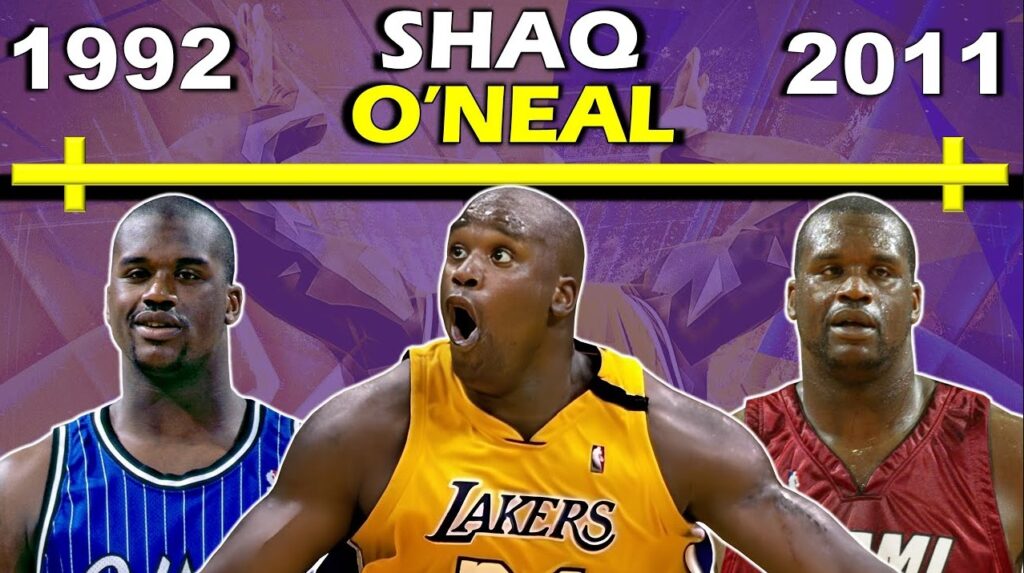Shaquille O’Neal: The Dominant Power That Defined an Era
In the modern NBA, where centers like Nikola Jokic and Joel Embiid have revolutionized the position with their three-point shooting and diverse skill sets, it’s worth remembering a time when centers were asked to dominate the box with their sheer physical presence and ability to score from the middle. In the 1990s and 2000s, no player embodied this traditional center role more fully than Shaquille O’Neal, who combined size, strength, and athleticism to be virtually unstoppable in the low post and establish himself as one of the most dominant forces in basketball history.

O’Neal’s professional journey began in spectacular fashion during the 1992-93 season when the Orlando Magic selected him with the first pick in the NBA Draft, instantly changing the team’s fortunes and signaling the arrival of a generational talent. As a rookie, O’Neal averaged 23.4 points, 13.9 rebounds and 3.5 blocks per game, becoming the first rookie since Michael Jordan in 1985 to be named an All-Star starter and eventually winning Rookie of the Year honors, while leading the Magic to 20 more wins than the previous season. His immediate impact was undeniable, as he brought a level of athleticism and dominance to the center position not seen since the days of Wilt Chamberlain and Bill Russell.
The following seasons in Orlando saw O’Neal continue to improve his statistical output and establish himself as one of the league’s top players with a combination of offensive prowess and formidable defense. In the 1994-95 season, O’Neal won his first and only scoring title, averaging 29.3 points per game, while also contributing 11.4 rebounds and 2.4 blocks, leading the Magic to their first NBA Finals appearance, where they defeated Michael Jordan’s Chicago Bulls in the Eastern Conference Semifinals before ultimately falling to Hakeem Olajuwon and the Houston Rockets in the Finals.

After four successful seasons in Orlando, O’Neal made the controversial decision to sign with the Los Angeles Lakers in 1996, seeking access to a larger market and winning a championship that would define the next chapter of his illustrious career. The move to Los Angeles was initially met with criticism from fans and media who questioned his loyalty, but O’Neal’s performance on the court quickly quelled those doubts as he averaged 26.2 points and 12.5 rebounds in his first season with the Lakers, instantly establishing himself as the team’s new main man and a fan favorite.
The Lakers years were the height of O’Neal’s dominance, as he formed a winning partnership with young point guard Kobe Bryant, creating one of the most successful dynasties in NBA history. The 1999-2000 season marked O’Neal’s most illustrious achievement, as he won regular season MVP, All-Star Game MVP, and Finals MVP, and led the Lakers to their first championship in twelve years while averaging 29.7 points, 13.6 rebounds, and 3.0 blocks per game during the regular season.

O’Neal’s championship success continued unabated over the next two seasons, as he became the first player since Michael Jordan to win three consecutive Finals MVP awards while leading the Lakers to an unprecedented three-peat from 2000 to 2002. During this remarkable run, O’Neal averaged over 30 points and 15 rebounds in each Finals series, demonstrating a level of playoff dominance few players in NBA history had ever achieved while establishing himself as the game’s most feared presence.

The relationship between O’Neal and Bryant began to deteriorate during the 2003-04 season, despite the team returning to the NBA Finals, where they ultimately lost to the underdog Detroit Pistons in a surprise upset that ended the Lakers’ championship chances. After this disappointing loss in the Finals, tensions between the two superstars reached a boiling point, leading to O’Neal being traded to the Miami Heat, a move that shocked the basketball world and marked the end of one of the most successful player pairings in league history. O’Neal’s transition to Miami was seamless, as he immediately formed a strong chemistry with young superstar Dwyane Wade, while maintaining his peak form despite being in his mid-30s. The 2005-06 season marked O’Neal’s final championship win, as he played a complementary role to Wade’s stellar performance in the Finals, helping the Heat overcome a 2-0 deficit to defeat the Dallas Mavericks and win the team’s first NBA championship in a dramatic six-game series.